Overview
The article focuses on the findings from the American Diabetes Association Scientific Sessions, emphasizing their significance in advancing diabetes research and treatment methodologies. It highlights recent breakthroughs in pharmacotherapy, innovative technologies for glucose monitoring, and the importance of patient-centered care, demonstrating how these developments collectively enhance the understanding and management of diabetes.
Introduction
The American Diabetes Association Scientific Sessions serve as a cornerstone for advancing diabetes research and management, bringing together healthcare professionals, researchers, and educators committed to improving the lives of those affected by diabetes. This premier event not only showcases the latest breakthroughs in treatment methodologies but also fosters critical discussions on effective management strategies.
With insights from leading experts and innovative presentations, the sessions highlight the ongoing evolution in diabetes care, including:
- Promising developments in pharmacotherapy
- Lifestyle interventions
- Surgical options
As the landscape of diabetes management continues to change, understanding these advancements is vital for healthcare providers and patients alike, ensuring that everyone has access to the best practices that can lead to improved health outcomes.
The Importance of the American Diabetes Association Scientific Sessions in Diabetes Research
The American Diabetes Association Scientific Sessions represent a crucial gathering for healthcare practitioners, researchers, and educators dedicated to care and treatment. This premier event, known as the American Diabetes Association Scientific Sessions, serves as a platform for sharing the latest advancements in blood sugar research, showcasing innovative treatment methodologies, and discussing effective management strategies. Significantly, top specialists like Philip Schauer, MD, have highlighted the importance of the American Diabetes Association Scientific Sessions, stating,
'The American Diabetes Association Scientific Sessions offer a crucial summary of the most recent discoveries in pharmacotherapy, lifestyle interventions, and surgical choices for attaining remission in this condition.'
Recent presentations, such as those by Linda DiMeglio, MD, have introduced updates in clinical science, including new biosimilars and modifications to the ADA Standards of Medical Care in Diabetes for 2022. Additionally, the case study presented by Intolerance and Kadimastem, which explored islet transplantation therapy aiming to provide a functional cure for Type 1 conditions without immunosuppressants, illustrated the practical implications of the research discussed. The study showed successful engraftment and improved glucose control in diabetic immunodeficient mice, although a timetable for human trials has yet to be established.
The collaborative environment fostered at the American Diabetes Association Scientific Sessions enhances dialogue among experts, leading to a deeper understanding of the condition and its complexities. This understanding is vital for the organization, which seeks to gather educational materials that represent the most recent discoveries and methods in blood sugar control, ultimately enhancing results for recently diagnosed individuals. With applications accepted until June 13, 2025, this commitment to knowledge exchange ultimately aims to elevate the quality of care provided to individuals living with this condition.
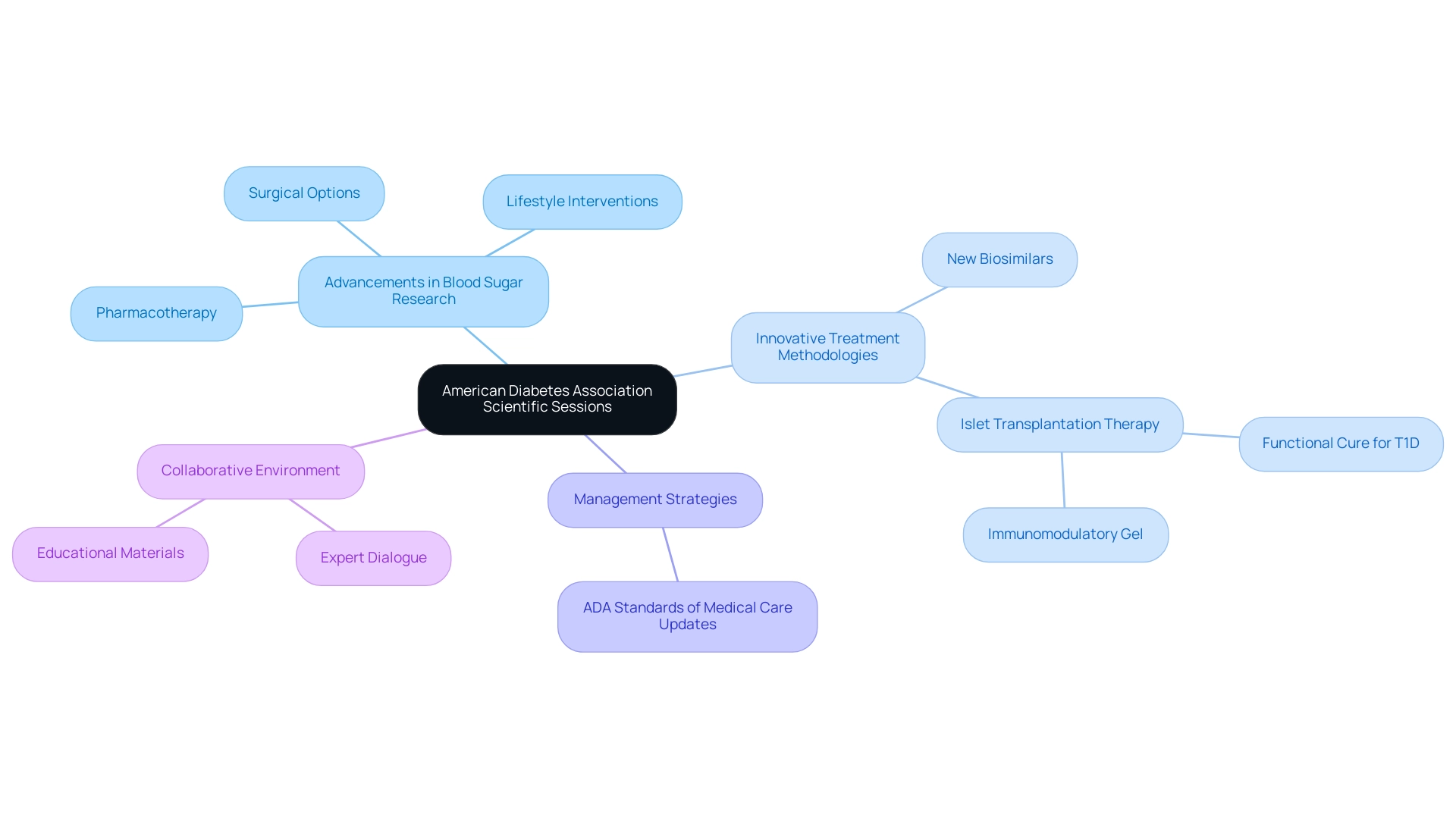
Recent Breakthroughs in Diabetes Treatment and Management from the Latest Sessions
As the new resource hub for Type 2 and Type 3 diabetes education is introduced, it will integrate the latest advancements in diabetes management to improve care for individuals. Recent breakthroughs in pharmacological options are designed to improve glycemic control while minimizing side effects, which is crucial for adherence and overall health. The organization will offer educational materials on these new therapies, ensuring that individuals are aware of their choices.
Additionally, innovative technologies such as continuous glucose monitoring systems are revolutionizing glucose tracking, and this organization will offer guidance on utilizing these tools effectively. The integration of telehealth solutions is also essential, facilitating ongoing engagement and support, particularly for those in remote areas. The organization aims to link individuals with telehealth resources that encourage ongoing care.
Moreover, studies on personalized medicine are creating opportunities for customized treatment plans, and the platform will include content that caters to the varied requirements of individuals with blood sugar issues. As highlighted by Dr. Tedros Adhanom Ghebreyesus, 'To manage the worldwide health crisis effectively, nations must promptly take action.' The organization will promote enhanced healthcare coverage and reimbursement policies to assist individuals with blood sugar issues, ensuring they have access to innovative treatments.
By emphasizing these advancements and their effects on health care for those with diabetes, T2 Solutions will enable both healthcare providers and individuals, ultimately resulting in improved health outcomes and a superior quality of life.
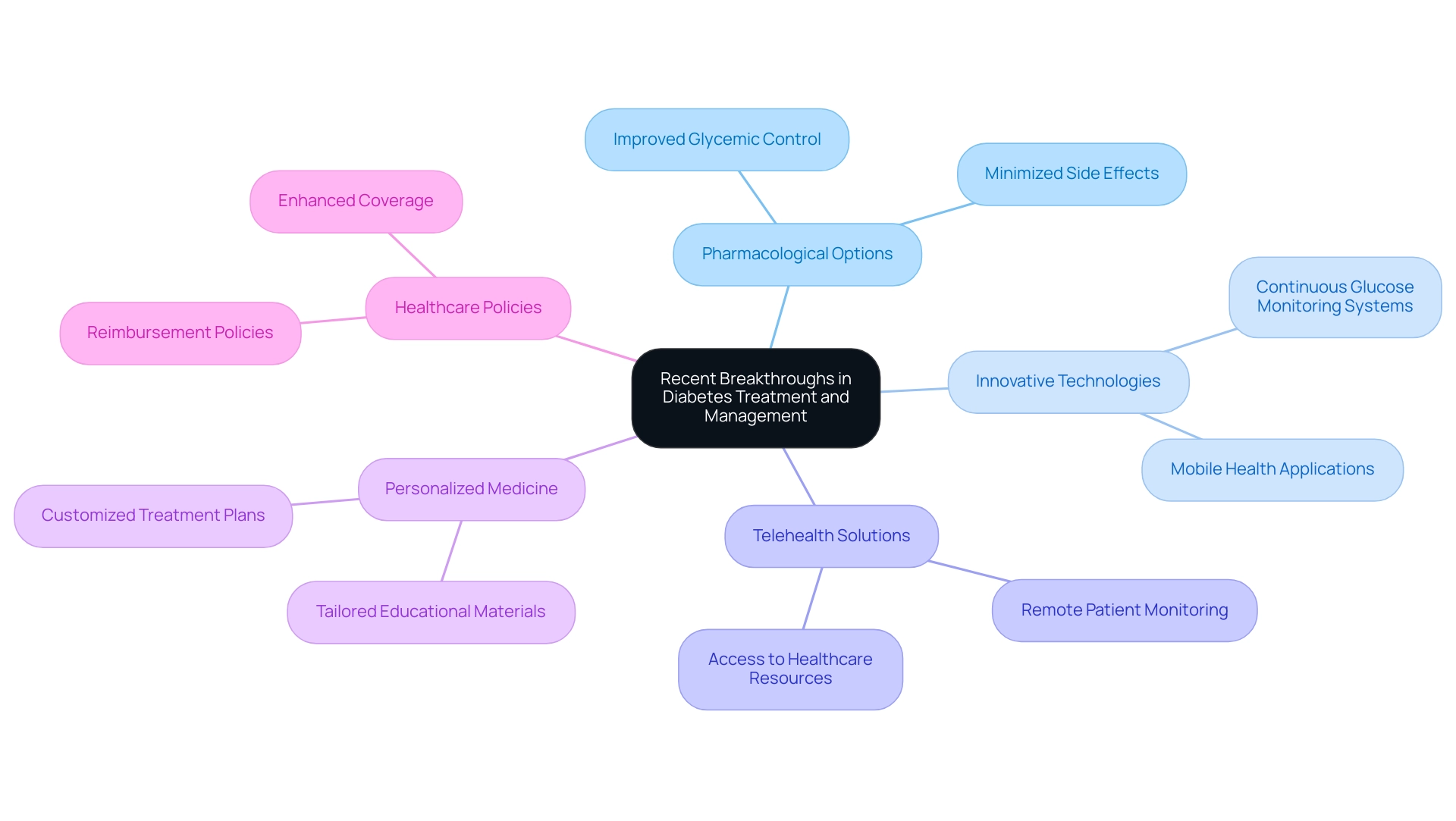
Emerging Technologies in Diabetes Management
The landscape of diabetes management is undergoing a significant transformation, driven by advanced technologies that enable individuals to take control of their health. Notably, artificial intelligence-driven glucose monitoring systems have shown impressive performance, with models such as that developed by Elhadd et al. accurately estimating normal glucose levels in 95.2% of readings and hyperglycemic events in 82.6% of cases.
These innovations not only simplify the self-management process but also promote more meaningful interactions between individuals and healthcare professionals. For instance, the FDA-certified Guardian Connect System utilizes AI to predict hypoglycemic attacks based on continuous glucose monitoring data, notifying individuals with high accuracy.
Moreover, the proliferation of smartphone applications dedicated to tracking dietary intake and physical activity is reshaping diabetes care. These apps facilitate real-time data collection and analysis, enabling healthcare providers to monitor individuals’ health metrics continuously. This capability leads to timely interventions and tailored care plans, enhancing overall patient outcomes.
As Preston et al. noted, "the system could achieve recall of 0.83, precision of 1.0, and F1 score of 0.91," which underscores the potential of technology in enhancing management of the condition.
A notable example in this domain is the integration of automatic retinal screening technologies like IDx-DR into care for individuals with blood sugar issues, particularly in underserved communities. The implementation of IDx-DR has resulted in earlier detection and treatment of diabetic retinopathy, significantly improving outcomes in these areas. The development of systems such as DeepDR, which provides real-time feedback and exhibits high sensitivity in detecting retinal lesions, illustrates how AI can significantly improve early intervention strategies.
As technology progresses, the advancement of these novel tools guarantees to improve the oversight of blood sugar levels, making it more efficient and tailored than ever before. Furthermore, the organization, presently in its initial phases, will offer advanced certification for health conditions and continuing education options designed for recently diagnosed individuals. This resource hub will focus on utilizing these technologies effectively in their care, offering access to a variety of educational content and community support.
As the organization evolves, individuals can anticipate frequent updates and useful resources to assist them in navigating their health journey.
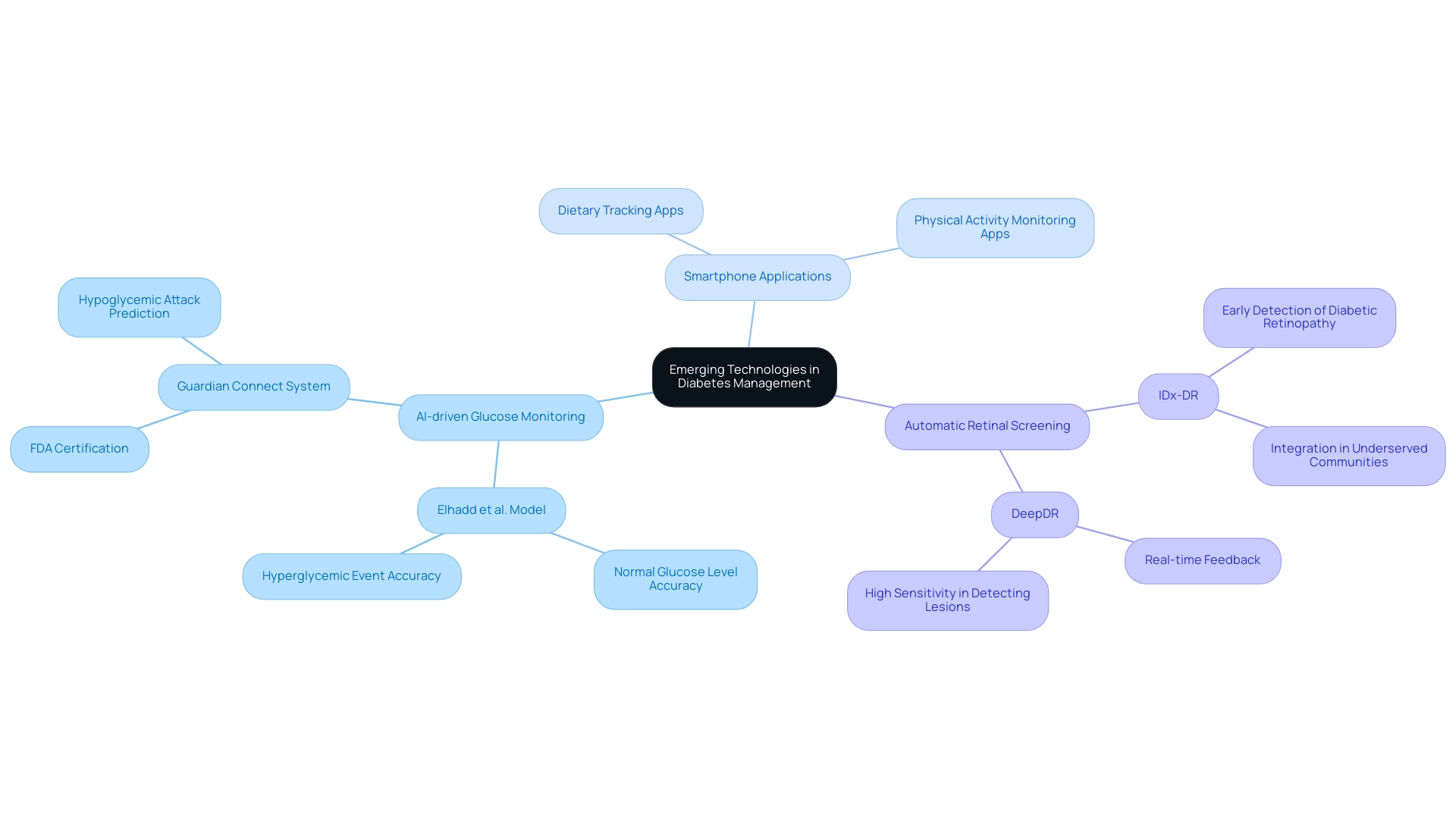
The Role of Nutrition and Lifestyle Changes in Diabetes Management
Nutrition and lifestyle modifications are essential elements of effective diabetes care, and this organization is committed to offering extensive resources for individuals recently diagnosed. Recent research highlights a strong correlation between dietary patterns and the risk of Type 2 Diabetes Mellitus (T2DM); for instance, prudent dietary patterns are associated with a lower risk compared to western dietary patterns. The American Diabetes Association emphasizes the significance of self-dietary control, stating, 'Self-dietary control is the key step in providing diabetics with the knowledge and skill related to treatment, nutritional aspects, medications, and complications.'
T2DSolutions will provide guidance on adopting a balanced diet that incorporates:
- Whole grains
- Lean proteins
- Healthy fats
These are essential for individuals managing their diagnosis. Additionally, we will promote meal planning strategies emphasizing:
- Portion control
- Low glycemic index foods
These strategies can significantly aid in glycemic control. Engaging in at least 150 minutes of moderate physical activity each week is recommended to enhance insulin sensitivity and bolster overall health.
It's crucial to recognize that foot infections arise in 10.4% of T2DM individuals, highlighting the need for effective handling strategies. Healthcare providers should screen for food insecurity and connect individuals to nutrition assistance programs, as these resources can significantly impact health outcomes. For example, social policies like the expansion of the child tax credit have shown promise in reducing food insecurity, thereby supporting overall health.
Moreover, the company will offer advanced certification in chronic illness care and ongoing education options, equipping newly diagnosed individuals with essential knowledge and skills for effective disease oversight. Through T2DSolutions, we aim to facilitate these lifestyle modifications, not only fostering better glycemic control but also aiding in weight control and lowering the risk of complications.
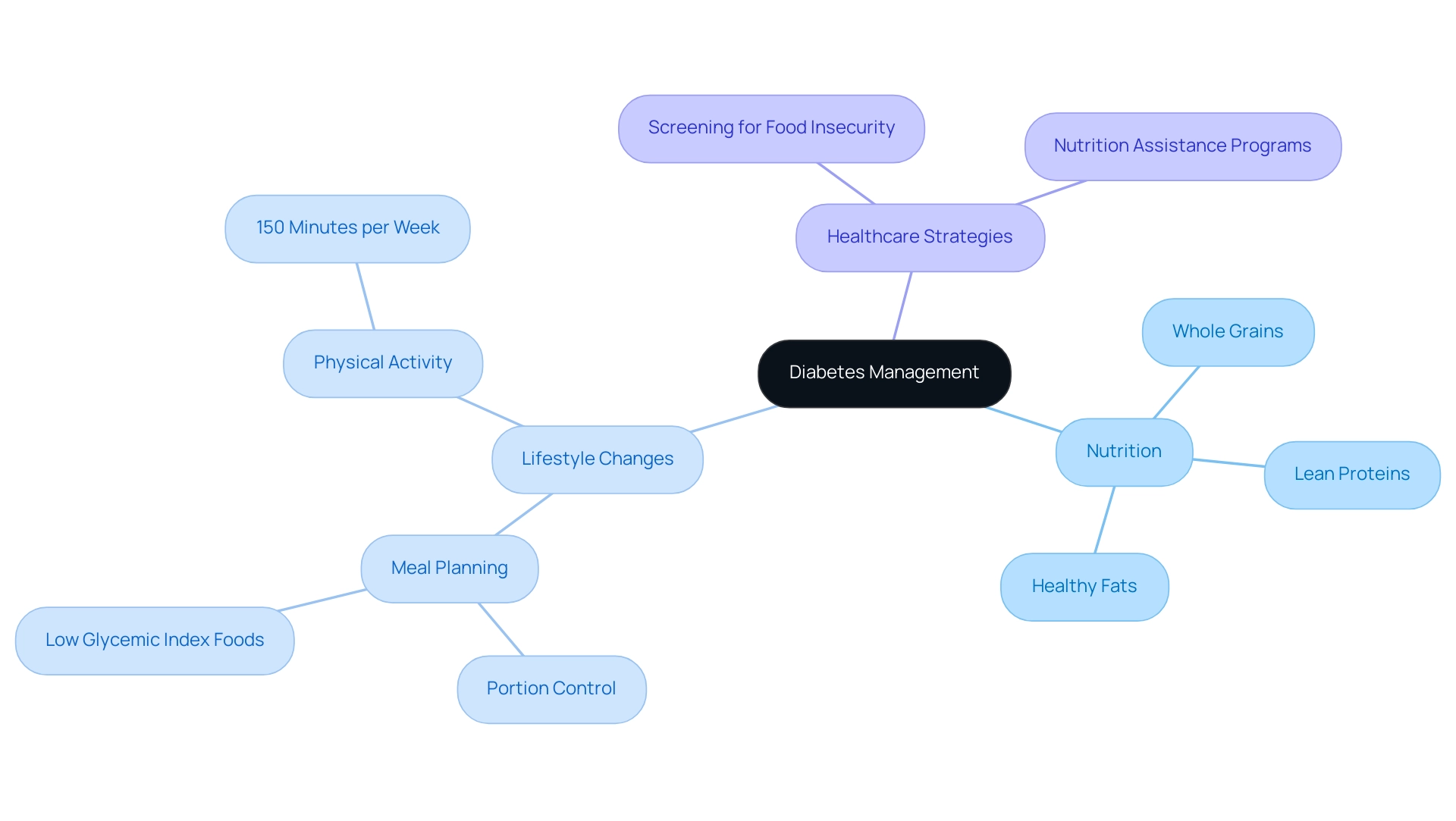
Patient-Centered Care Approaches in Diabetes Management
Implementing a person-centered care model is critical in the management of diabetes, as it cultivates a collaborative relationship between healthcare providers and individuals. By prioritizing individuals' preferences, needs, and values, this model enables the development of personalized treatment plans that align with individual lifestyles. Effective communication plays a pivotal role in this approach; healthcare professionals must actively involve individuals in conversations about their treatment options while fostering an environment conducive to shared decision-making.
Evidence supports that such engagement can significantly enhance adherence to treatment regimens and increase overall satisfaction with care. As Kainat Asmat states,
Overall, this review provided with the evidence that PCC for self-management is effective in improving glycemic control and self-care behaviors in adults with type 2 metabolic disorder.
However, it is important to note that substantial improvements in outcomes are unlikely in the short term.
The research carried out from November 1, 2015, to March 1, 2018, emphasizes the importance of integrating feedback from individuals, which can result in enhanced health results, especially considering the increasing occurrence of type 2 conditions and the pressing requirement for efficient self-management approaches. The organization intends to function as a thorough resource for recently diagnosed individuals, providing educational materials like interactive online courses, informative webinars, and downloadable guides on managing the condition. Additionally, T2DSolutions will facilitate community support through forums and peer support groups, enhancing understanding and implementation of patient-centered care.
The review assessed secondary outcomes related to diet control and physical activity, finding significant improvements in these areas, but noted no significant effect on medication adherence. This suggests that while patient-centered self-management interventions effectively improve dietary behaviors and physical activity, further exploration is needed to enhance medication adherence outcomes.
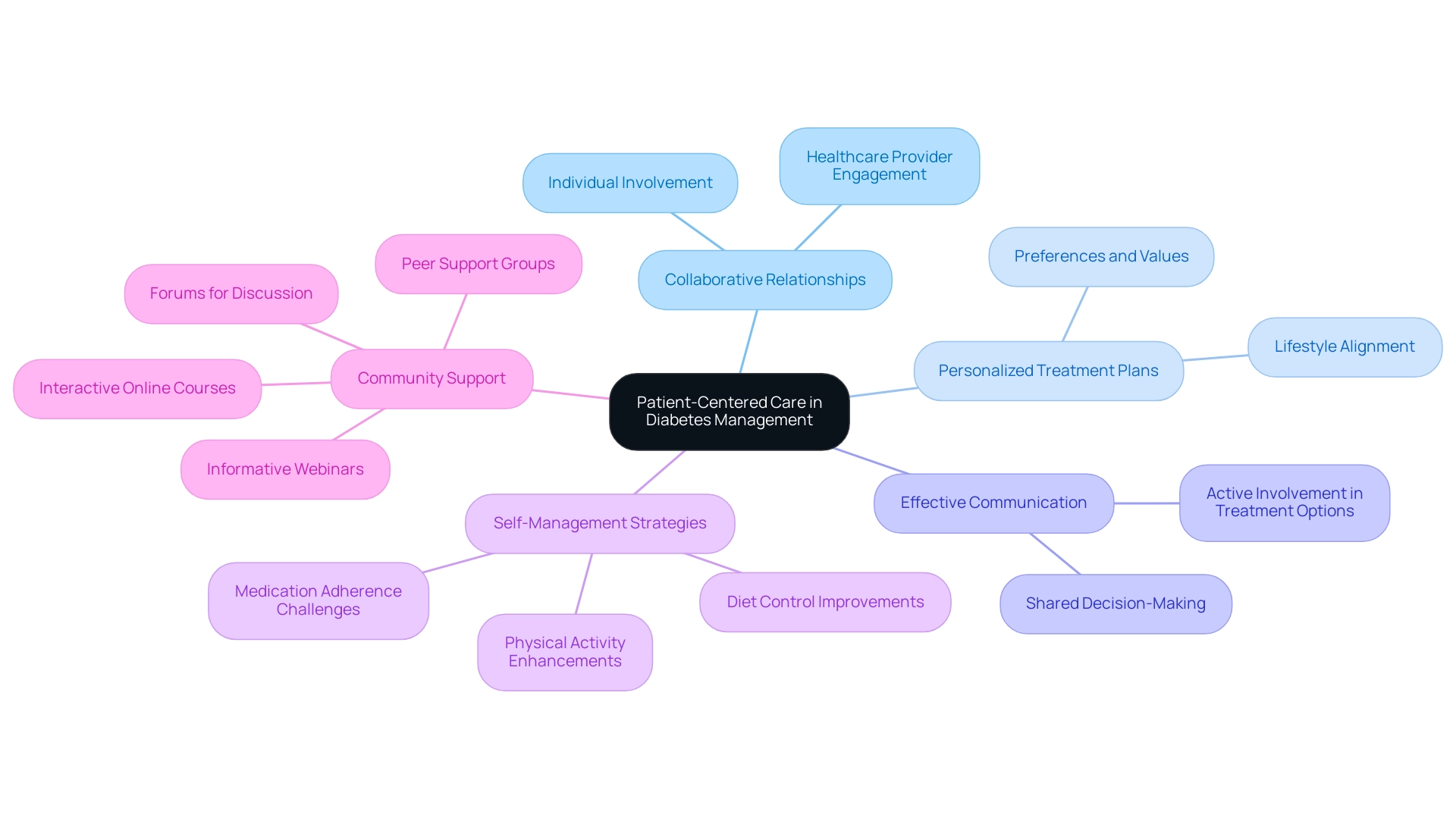
Future Directions in Diabetes Research
The landscape of sugar regulation research is becoming increasingly promising, particularly with a focus on gene therapy as a potential cure. Recent studies indicate a significant increase in cases of the disease, with untreated instances rising 3.5 times from 1990 to 2022. Alarmingly, India and China represent the largest proportions of adults with high blood sugar, with 212 million and 148 million respectively.
This trend has encouraged researchers to explore innovative solutions, such as advancements in biotechnology that enhance insulin delivery systems, thereby improving the control of blood sugar levels. Furthermore, the role of microbiome health is gaining attention, as emerging evidence suggests its potential influence on health outcomes. Experts are also acknowledging the critical impact of socioeconomic factors on the management of this condition.
As emphasized by Prof. Jonathan E. Shaw, 'These factors indicate the necessity to go beyond universal insurance alone, and to implement national programs that leverage and adapt universal insurance and primary care expansion to address the burden of this condition.' This highlights the necessity for enhanced health insurance and primary health care to improve detection and treatment of the condition. Collectively, these research directions highlight the importance of developing comprehensive strategies that not only focus on treatment but also aim to mitigate health disparities.
Considering these trends, T2DSolutions is dedicated to offering educational materials and community assistance to enable individuals in their health journey. As we approach the upcoming UN High-level Meeting on NCDs in September 2025, this meeting is seen as a pivotal moment for strengthening global health systems and aligning efforts towards addressing diabetes, which will be crucial in shaping the future of diabetes prevention and management.
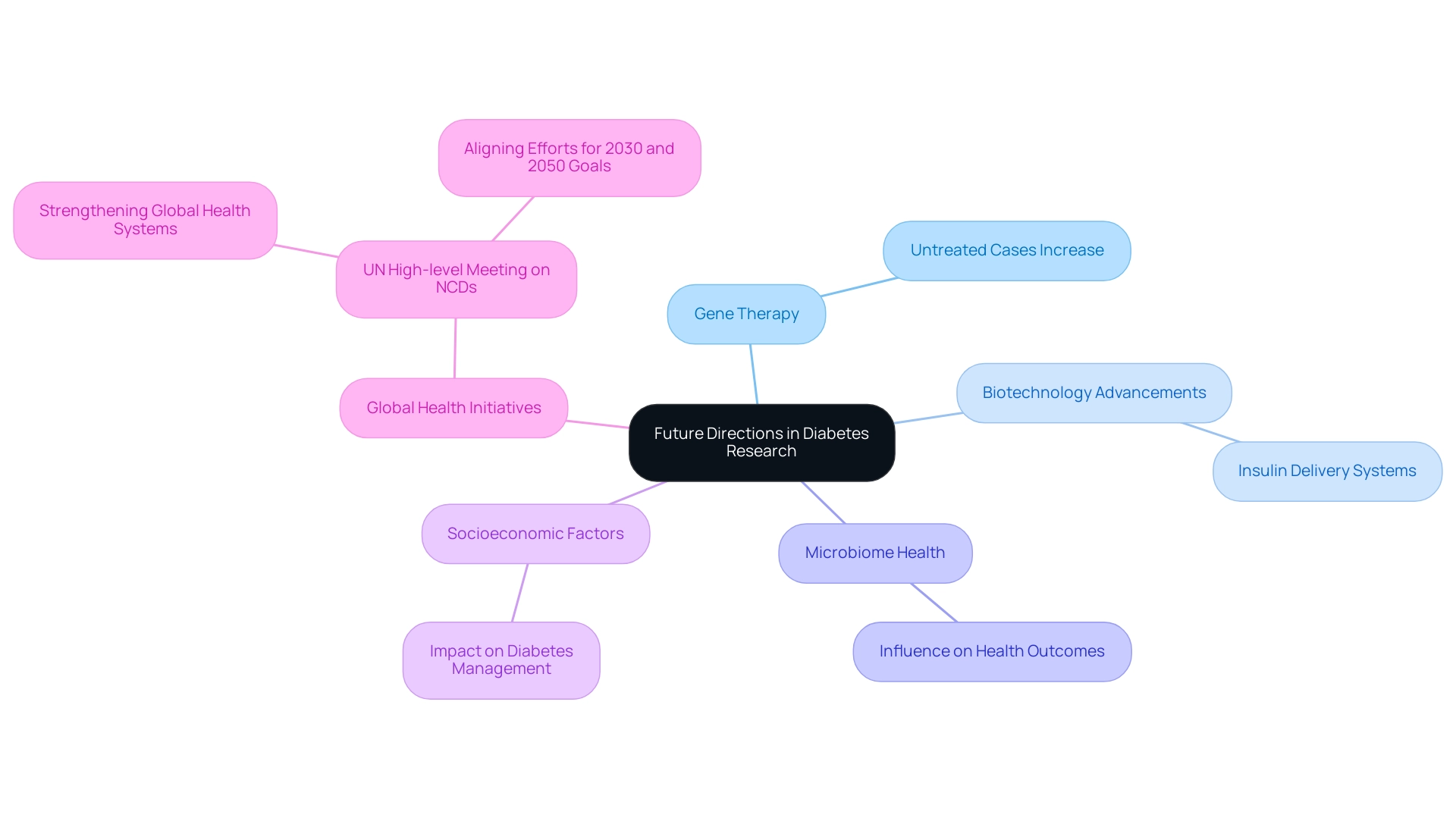
Conclusion
The American Diabetes Association Scientific Sessions play a pivotal role in the evolution of diabetes research and management. By showcasing recent advancements in pharmacotherapy, lifestyle interventions, and emerging technologies, these sessions provide healthcare professionals and patients with vital knowledge to improve health outcomes. The insights shared by experts help to illuminate the complexities of diabetes, fostering a collaborative environment that enhances understanding and drives innovation.
As T2DSolutions emerges as a resource hub for diabetes education, it will integrate these advancements to empower patients and healthcare providers alike. With a focus on personalized care, innovative technologies, and patient-centered approaches, T2DSolutions aims to address the diverse needs of individuals living with diabetes. By promoting effective management strategies and lifestyle changes, the initiative seeks to enhance the quality of life for newly diagnosed patients.
Looking ahead, the future of diabetes research holds promise, particularly with new treatment methodologies and a deeper understanding of the social determinants of health. The commitment to ongoing education and community support will be essential as the landscape of diabetes management continues to evolve. By leveraging these advancements, stakeholders can work together to improve care, ensure equitable access to resources, and ultimately combat the global diabetes epidemic.



